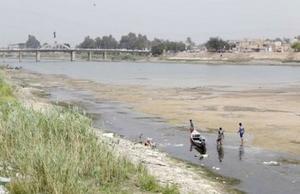Water warsISIS uses control of water as a tool of war
Global security analysts have warned for some time now that water scarcity due to climate change will be used as a tool of war in regions with poor governance.The on-going wars in Iraq and Syria provide the first examples of the strategic and tactical use of water as a tool of war, as militant groups operating in both countries have been using water against residents of areas they control. “ISIS has established a blueprint that can be used by other entities to take advantage of drought and water scarcity,” writes one researcher. “For all the conversation about ISIS taking control of oil refineries, one could argue that their control of water is even more significant, as it deprives the population of a resource necessary for daily sustenance and gives the militant group significant leverage over local governments and populations.”

A segment of the Euphrates river after ISIS cut off supply // Source: annahar.com
Global security analysts have warned for some time now that water scarcity due to climate change will be used as a tool of war in regions with poor government. Abhishek Ramaswami, a researcher at New York University’s Center for Global Affairs, writes that, in this sense – that is, the use of water and water scarcity as a tool of war — “the impact of climate change isn’t going to be felt 20, 30, or 40 years from now. The impacts are being felt today and will only worsen as time goes on.”
The on-going wars in Iraq and Syria provide the first examples of the strategic and tactical use of water as a tool of war, as militant groups operating in both countries have been using water against residents of areas they control. In May, Jabhat Al-Nasura cut off water to the Shiite-dominated city of Aleppo in an effort to weaken support there for the regime of Bashar al-Assad.
Ramaswami notes that “ISIS represents the first significant case of the results of climate change being used as a tool of terror.” In the spring and summer, ISIS captured the Mosul Dam and the Fallujah Dam, but was repelled by Kurdish and coalition forces before being able to use the two dams for strategic purposes.
In July, the Islamic State (ISIS) tried to gain control of the Euphrates River by seizing the Haditha Dam, the second largest in Iraq. Had ISIS succeeded in doing so, the group could have inflicted a humanitarian disaster on Iraq’s thirty-two million people who depend on the Euphrates for water.
ISIS leaders acknowledge that as long as they controlled regional dams and local water sources, seasonal droughts will force Shiite populations to move out of ISIS-controlled territories.
Shortly after ISIS captured Mosul, residents fled as soon as water and electricity were cut off, but many returned after the group reversed its actions in an attempt to gather support among the local population. The U.S. military helped Kurdish forces recapture the Mosul dam, the fourth largest in the Middle East. Had ISIS destroyed the dam, the resulting flood would have displaced and killed millions of Iraqis.
